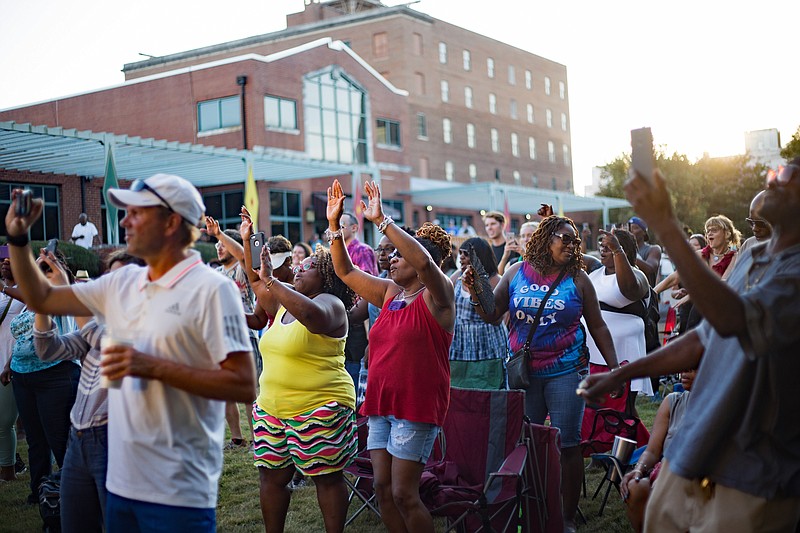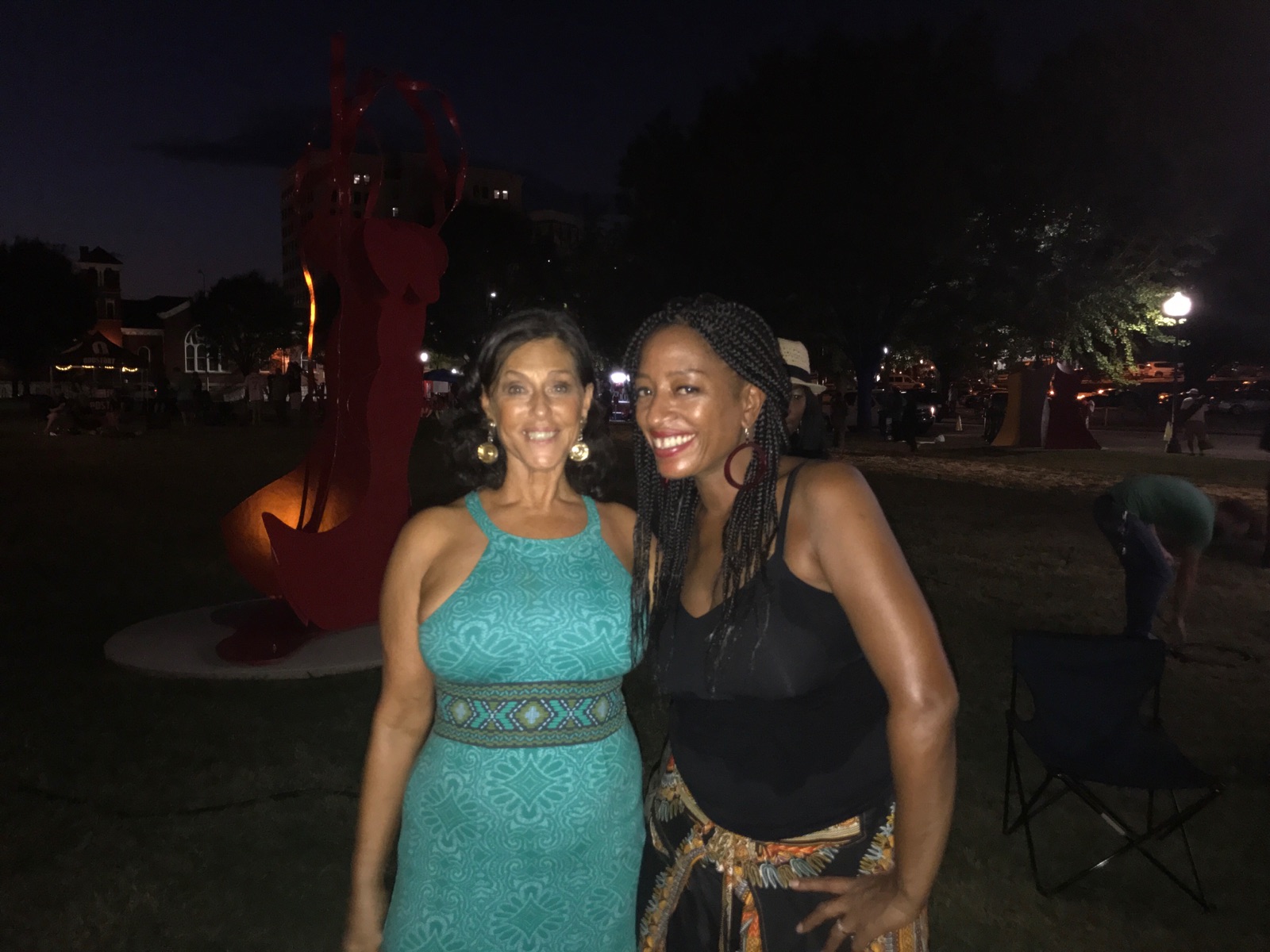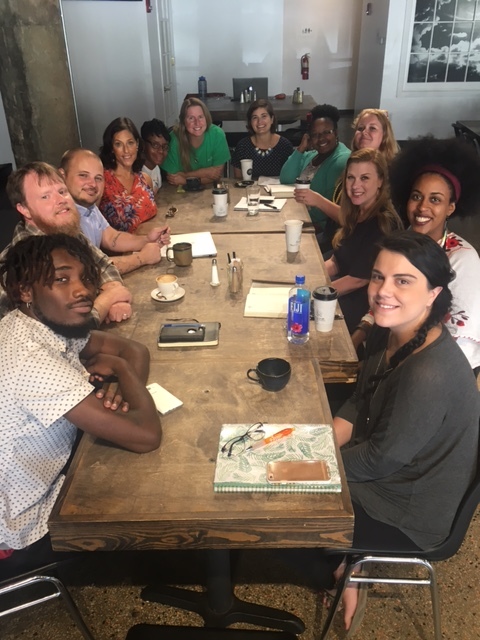Grant winners
Chattanooga was one of 15 Levitt AMP grant winners for 2017. The others:› Berea, Kentucky› Carson City, Nev.*› Denison, Texas**› Greensboro, N.C.*› Hattiesburg, Miss.› Jacksonville, Ill.*› Middlesboro, Ky.**› Ocala, Fla.› Santa Fe, N.M.› Sheboygan, Wisc.**› St. Johnsbury, Vt.› Stevens Point, Wis.› Trenton, N.J.**› Utica, N.Y.*Note: * 2016 Levitt AMP winner; ** 2015 and 2016 Levitt AMP winner
Mortimer Levitt was a passionate man who built a fortune in the clothing business in New York. He believed so deeply in the power of music to bring communities together, he spent the years before his death in 2005 offering to fund the building of music venues for free concerts in cities all over the country.
He believed so strongly that he insisted his daughter, Liz, carry on the mission. She was in town late last month, along with Levitt Foundation Executive Director Sharon Yazowski, to talk to community leaders involved in putting on the Levitt AMP series of free shows held at the Bessie Smith Cultural Center.
The two traveled here from the foundation's California home and spent almost two days meeting with members of the various community groups that have collaborated on the 10-week series, which continues through October. Performances take place each Thursday beginning at 5:45 p.m.
The series is presented by Jazzanooga, Urban League of Greater Chattanooga, Chattanooga Convention & Visitors Bureau, the city of Chattanooga's Office of Multicultural Affairs and the Bessie Smith Cultural Center. The Levitt Foundation provides funding, along with two local foundations, Lyndhurst and Benwood, as well as several local businesses.
More Info
To learn more, visit: http://concerts.levittamp.org/chattanooga
Remaining schedule
Note: Opening acts start at 5:45 p.m., headliners at 7, on the lawn of the Bessie Smith Cultural Center, 200 E. M.L. King Blvd.› Oct. 5: All Cows Eat Grass, with Seaux Chill opening› Oct. 12: The Nth Power, with Sound Advice featuring Neshawn Calloway opening› Oct 19: Irene Diaz, with East Lake Expression Engine opening› Oct. 26: Tank and the Bangas, with The Creative Underground opening
The series to date has featured a mix of hip-hop, urban, jazz, zydeco, R&B, soul and reggae with artists Kool Moe Dee, Masego, Avery Sunshine, Terrance Simien & The Zydeco Experience and Nick Lutsko. Levitt said before the Sept. 21 Julie Dexter show that the visit here showcased everything the series is designed to do.
"We met business owners, we met artists and we met people who have helped support and create the flow and feel of the concert series," Levitt said.
"Understanding that our purpose is to bring people together and strengthen communities through free live music, we experienced that today."
The Levitt AMP (Amplify Music Place) series was started in 2014, with the first concerts taking place in 2015. Fifteen cities across the country were awarded a $25,000 matching grant to produce 10 free concerts. This is the first year the series is being held here.
Levitt officials have a fairly complex system of requirements in place for how they choose the cities. Yazowski said the foundation looks for cities with a neglected or underutilized part of town that needs revitalization and/or communities or groups that could benefit by coming together for a free concert.
It also looks for communities that have an outdoor space for such shows that would allow for kids to run around, neighbors to sit next to each other and visit and for small-business owners from the community to set up vendor booths.
All of the vendors here are local businesses who are charged a fee, which is put back into the series to help pay for things like security, marketing and venue rental.
The foundation also looks for commitment from the city and a willingness from various community groups to make the series a success. The front lawn of the Bessie fit the venue bill, and Levitt said the various involved groups here have proven they fully understand the foundation's mission.
"It has been a wonderful example of what we are all about," she said.
Chattanooga has several free concert series, including Nightfall at Miller Plaza and Riverfront Nights at Ross's Landing, and the mission for each includes animating a section of downtown and bringing people together through music. Levitt AMP has the added component of involving groups that don't normally work together.
Chattanooga Convention & Visitors Bureau President Bob Doak said the series fulfills several objectives.
"The Levitt AMP Chattanooga Music Series gave us an opportunity to create a series for everyone," he said.
"Each committed partner involved in putting this series together reaches a wide range of audiences within Chattanooga. It takes all of us working together to bring a diverse audience to the lawn each week, and that is exactly what you see at Levitt AMP. Jazzanooga has done an incredible job curating a talented, varied lineup. Pair that with free admission, and it creates a huge cross-sector appeal across our city."
The Levitt AMP series is actually a smaller version of a larger permanent venue program started by Mortimer Levitt before his death. Westport, Conn., where he had a second home, sought to build an amphitheater in a neglected part of town and to host concerts there to bring groups together.
Levitt was the major donor, and the venue was named the Levitt Pavilion of Performing Arts. It proved so successful, he wanted to recreate it in other major cities. He contacted city mayors and offered to fund the projects himself.
"My father really believed in value, having grown up poor and having had very little in his life," Levitt said.
"The fact that it was free touched something deep and primal in his life, and he wanted that carried out elsewhere. His vision was to have 25 Levitt Pavilions all modeled on Westport. He wanted them all done the same way."
Yazowski said he didn't get many takers until daughter Liz Levitt, who was living in California, reached out to some of the community leaders she knew in the Pasadena area. Eventually, Mayor Bill Bogart worked with the foundation to transform a concert shell there.
Similar projects have been undertaken in Los Angeles, Memphis and Arlington, Texas, in the last decade. In some cases, pre-existing outdoor shells or pavilions have been revitalized; in others, new ones are built.
The Levitt Foundation provides funding ranging from $500,000 to $1 million for 50 free concerts, with many taking place over several nights during the week. In all of the Levitt concerts, the musicians are paid, Yazowski said, and all are outdoors.
"The open lawn setting is the key characteristic," Yazowski said.
"The idea is to have a place where kids can run and play and people can interact. Each community can make the experience what they want it to be by how they program the music, who the opening acts are and who they showcase between the first and second act."
Some allow local youth groups to perform between sets, for example.
"The environment is relaxed and welcoming, and people are connecting across demographic boundaries," Yazowski said. "Music is a vehicle to connect people, and it transcends racial, income and social boundaries."
Yazowski said the Levitt AMP series is targeted toward smaller cities and metropolitan areas. Middlesboro, Ky., is a town of about 10,000. A group of people there applied for a Levitt AMP grant and built a makeshift stage out of crates in a neglected part of town for their concert series.
A few hundred people showed up for the shows, so the impact wasn't huge in terms of numbers, Yazowski said, but a local steel company was so inspired by the movement, it donated steel for a permanent stage.
Yazowksi said judging how a series is working varies from location to location.
"We actually avoid using the word success, because it varies. We use the term 'moving the needle.' In some communities moving the needle from here to here (she holds up her thumb and forefinger about an inch apart) is very meaningful. In others, moving it from here to here (now, she spreads her hands apart) is impactful."
In Arlington, where a pavilion was revitalized in a transitional part of town with no identity, there are now 12 new restaurants, a walking path and public art. The music pavilion has also been used for graduations and church services.
"It is a real community asset," Yazowski said.
Asked if she can envision a scenario where a series is so transformative in a community that it is no longer needed, Yazowski seemed confused at the idea and finally shook her head and said, "There is still too much work to be done."
Contact Barry Courter at bcourter@timesfreepress.com or 423-757-6354.


